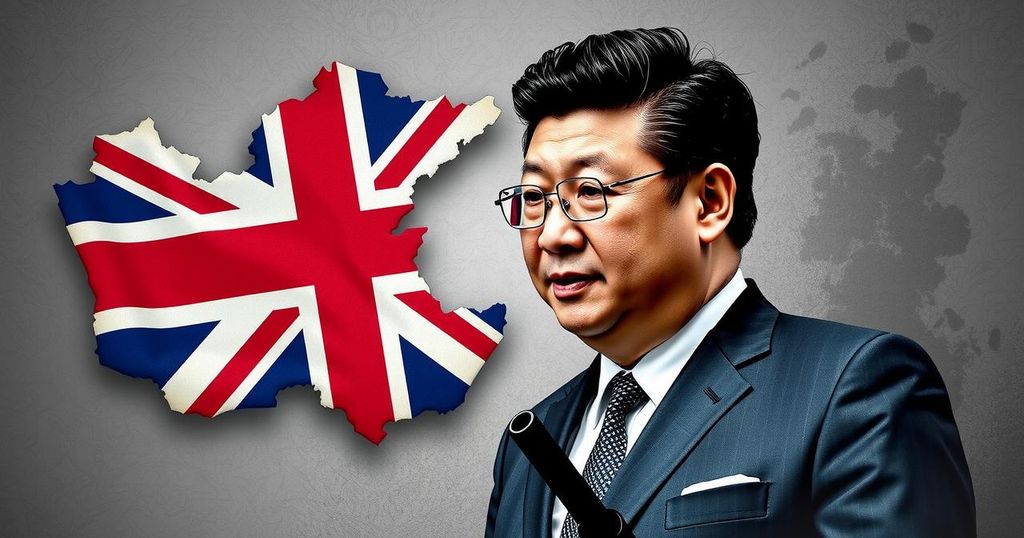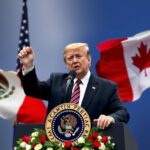UK-China Relations Complicated by Spy Allegations and Security Concerns
The UK faces a dilemma regarding its relationship with China following espionage allegations against businessman Yang Tengbo, who is linked to Prince Andrew. Calls for stronger regulatory measures against Chinese influence juxtapose the government’s desire for economic cooperation amid security concerns. Delays in implementing a Foreign Influence Registration Scheme further complicate this issue as the UK aims to bolster its economic ties while navigating national security threats.
The Chinese embassy has urged the United Kingdom to “stop creating trouble” following the ban of businessman Yang Tengbo, who has been accused of espionage but denies any wrongdoing. His connections to Prince Andrew have reignited discussions regarding the classification of China as a national security threat, presenting a dilemma for the UK government as it seeks to strengthen economic ties with China and address global issues such as climate change.
In Parliament, numerous senior Conservative MPs have called for enhanced measures to safeguard against covert Chinese influence, raising the need for a Foreign Influence Registration Scheme. This proposed scheme requires individuals and organizations acting on behalf of a foreign power to disclose their political lobbying activities, with an enhanced tier for countries perceived as significant threats. Although the scheme was initially prepared for implementation, its rollout has been deferred, now anticipated for next summer.
Former Conservative Home Secretary Suella Braverman asserted that the scheme was “ready to go” at the time of the last election, echoing the sentiments of other Conservative leaders who demand China’s inclusion in the enhanced tier. Further escalating the matter, former security minister Tom Tugendhat revealed that MI5 had indicated the scheme would lack effectiveness if China was not included. Meanwhile, Sir Iain Duncan Smith, a tenacious critic of China, stressed the urgency of implementing these protective measures to guard against espionage, expressing that Yang is merely one among many infiltrators within UK institutions.
Historically, the Conservative party has been split on designating China as a security threat, with no significant developments occurring during its governance. Security Minister Dan Jarvis emphasized that under Labour’s leadership, the scheme was not fully ready, but preparations are underway to propose it in Parliament soon. Despite this, he did not commit to confirming China’s status in the enhanced tier, noting that assessments would be determined by “robust security and intelligence analysis.”
Such a designation would likely incite diplomatic tensions with China, complicating ongoing attempts by the UK government to foster a stable relationship. Recent meetings between Sir Keir Starmer, the UK Prime Minister, and President Xi Jinping, as well as planned visits by Chancellor Rachel Reeves to Beijing, reflect ongoing aspirations for cooperative dialogue despite the history of strain over China’s policies against the Uyghurs and pro-democracy advocates in Hong Kong.
While expressing concerns about China, Mr. Starmer reiterated the need for collaboration on trade and climate issues. Given China remains one of the largest trading partners of the UK, any diplomatic fallout could severely hinder economic growth objectives. Major financial institutions, including HSBC and Standard Chartered, have expressed apprehension about the repercussions of placing China in the enhanced tier, fearing adverse effects on business operations and reputational damage.
China has staunchly denied allegations of espionage, accusing British politicians of attempting to “smear” the nation. As discussions regarding China’s categorization as a national security risk move forward, this ongoing dispute may further complicate the UK’s efforts to mend relations with China.
The United Kingdom’s relationship with China has become increasingly complex, especially in light of recent espionage allegations involving businessman Yang Tengbo. This situation emphasizes the UK government’s struggle to balance economic interests with national security concerns. Traditionally, China has been regarded as a significant trading partner, which necessitates cautious diplomatic engagement to avoid jeopardizing economic growth amid security challenges. The emergence of calls from members of Parliament for a regulatory framework to monitor foreign influence illustrates a growing demand for accountability in how foreign powers interact with UK politics and institutions.
In summary, the revelations surrounding Yang Tengbo and the corresponding reactions from the Chinese embassy present a significant challenge for the UK government. The calls for a stricter Foreign Influence Registration Scheme reflect a heightened awareness of national security risks posed by foreign espionage. Nevertheless, the complexities of the UK-China relationship necessitate careful diplomacy to avoid detrimental impacts on economic growth while addressing legitimate security concerns. The future implementation of new regulations will undoubtedly shape the trajectory of UK-China relations going forward.
Original Source: www.bbc.com








Post Comment